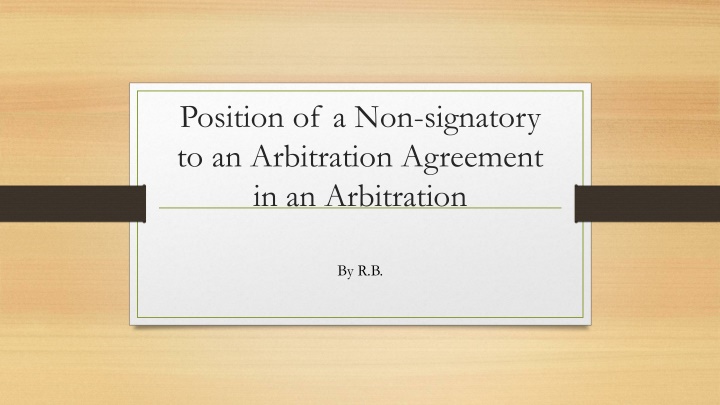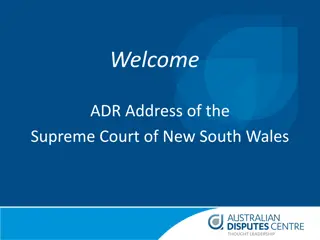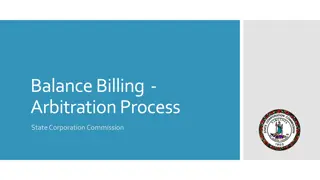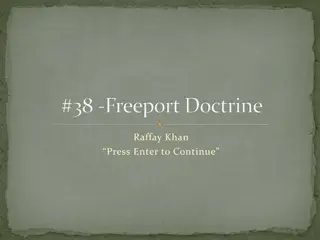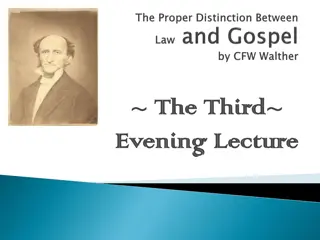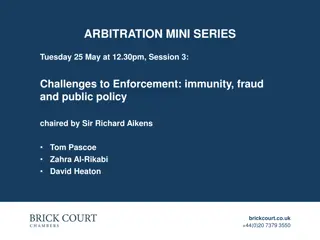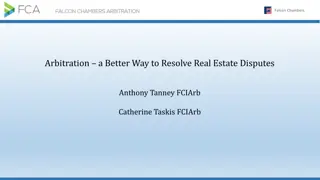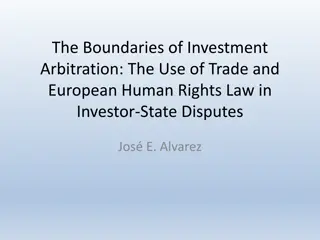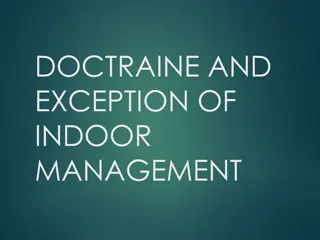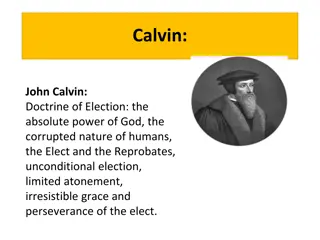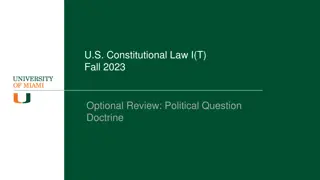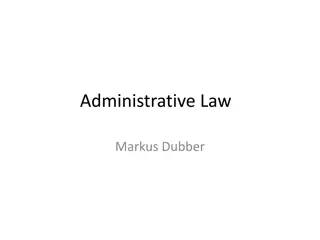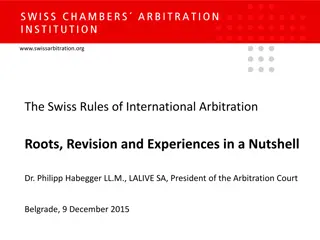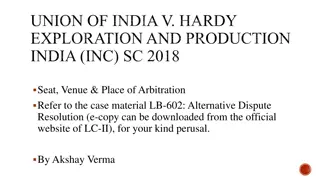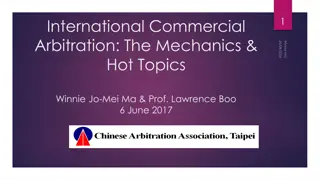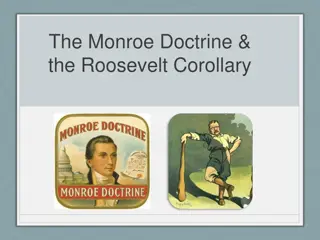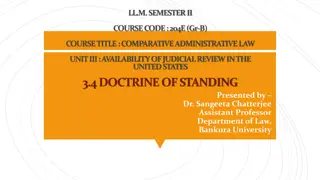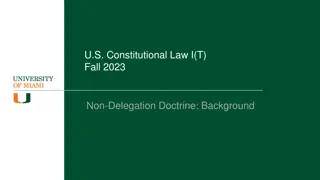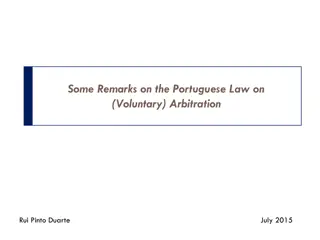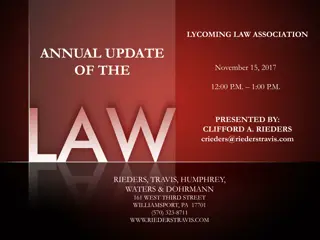The Doctrine of Privity and Non-signatory in Arbitration
The Doctrine of Privity in contract law states that only parties to a contract can enforce its terms, excluding third-party beneficiaries. However, in certain cases, such as piercing the corporate veil or involving group companies, non-signatory affiliates may be bound by an arbitration agreement. This concept has been applied in international arbitrations to extend jurisdiction to non-signatories based on mutual intent. The Dow Chemical v. ISOVER case exemplifies how a tribunal recognized a parent company's control over subsidiaries to uphold jurisdiction in arbitration proceedings.
Download Presentation

Please find below an Image/Link to download the presentation.
The content on the website is provided AS IS for your information and personal use only. It may not be sold, licensed, or shared on other websites without obtaining consent from the author.If you encounter any issues during the download, it is possible that the publisher has removed the file from their server.
You are allowed to download the files provided on this website for personal or commercial use, subject to the condition that they are used lawfully. All files are the property of their respective owners.
The content on the website is provided AS IS for your information and personal use only. It may not be sold, licensed, or shared on other websites without obtaining consent from the author.
E N D
Presentation Transcript
Position of a Non-signatory to an Arbitration Agreement in an Arbitration By R.B.
The Doctrine of Privity In Tweddle v. Atkinson, the Court acknowledged the existence of contrary authorities, but held that the Doctrine of Privity of contract meant that third party beneficiary could not enforce against the promisor the promise that the promisor had made to the promisee. The rule was affirmed in Dunlop Pneumatic Tyre Co. Ltd. v. Selfridge & Co. Ltd. To begin with it is very necessary to understand what this doctrine actually speaks about. In layman's language the "Doctrine of Privity" can be worded so as to mean that a contract cannot confer rights or impose those obligations arising under it, on any person except the parties to it. - Harnam Singh v. Purbi Devi, AIR 2000 HP 108; Narayani Devi v Tagore CommericalCorpn Ltd AIR 1973 Cal 401.
Cases where the Doctrine of Privity could be transgressed Piercing of the Corporate Veil within group companies Substituted Parties Agency Novation Assignment
Piercing of Corporate Veil The Group of Companies Doctrine - This doctrine has developed in the international context, whereby an arbitration agreement entered into by a company, being one within a group of companies, can bind its non- signatory affiliates or sister or parent concerns, if the circumstances demonstrate that the mutual intention of all the parties was to bind both the signatories and the non-signatory affiliates. This theory has been applied in a number of arbitrations so as to justify a tribunal taking jurisdiction over a party who is not a signatory to the contract containing the arbitration agreement. [ Russell on Arbitration ].
Dow Chemicals (USA) v. ISOVER A prominent case covering group of companies is the Dow Chemical v ISOVER ICC arbitration. The dispute arose out of several contracts executed by various Dow Chemical Company subsidiaries (but not the parent company itself) and ISOVER. Dow Chemical Company together with its subsidiaries commenced arbitration. ISOVER objected to jurisdiction over the claims asserted by Dow Chemical Company (Parent Company )on the ground that the latter was not a party to the contract. The tribunal upheld its jurisdiction. It is also to be noted that in the above mentioned case the Int l Arbitration Tribunal chaired by Professor Sanders found that a parent company exercised absolute control over its subsidiaries having either having either signed the relevant contracts or, like DOW Chemical France, effectively and individually participated in their conclusion, their performance and termination . On basis of this and existing trade usage One and the same economic reality (une realit conomique unique), the tribunal concluded that it had jurisdiction over all the named parties. their
Doctrine of Alter Ego ALTER EGO DOCTRINE - This the doctrine that treats a corporation and those who own its stock to be identical. It is applied with no regard to the corporate entity in order to further justice ( Black s Law Dictionary ) Major Cases : 1. Aloe Vera of America, Inc v Asianic Food (S) Pte Ltd and another [2006] 3 SLR(R) 174 2. GMR Energy Limited v. Doosan Power Systems India Private Limited & Ors 2017 SCC OnLine Del 11625
Aloe Vera of America, Inc v Asianic Food (S) Pte Ltd and anr. In Aloe Vera of America, Inc v Asianic Food (S) Pte Ltd and another [2006] 3 SLR(R) 174 (Aloe Vera of America), the arbitration agreement was entered into between Aloe Vera of America Inc (AVA) and Asianic Food (S) Pte Ltd (Asianic). However, it was the shareholder of Asianic, Mr Chiew Chee Boon (Mr Chiew) who had signed the contract containing the arbitration agreement on behalf of the Asianic. A dispute arose between AVA and Asianic, and AVA commenced arbitration proceedings against both Asianic and Mr Chiew. Here, the arbitral tribunal found that Mr Chiew was at all material times the president, a director and shareholder of Asianic and that Asianic was undercapitalised, failed to honour corporate formalities and was the alter ego of Mr Chiew , and rendered a final award ordering both Asianic and Mr Chiew to pay AVA damages. When AVA sought to enforce the arbitration award in Singapore, Mr Chiew sought a declaration that he was not a party to the arbitration agreement.
Aloe Vera of America, Inc v Asianic Food (S) Pte Ltd and anr. The Singapore High Court found that whether a person is an alter ego of a company is an issue which can in an appropriate case be decided by arbitration. In holding that Mr Chiew was a party to the arbitration agreement, the arbitrator was acting within his jurisdiction, as it was an accepted principle of arbitration law that an arbitral tribunal has jurisdiction to determine whether a particular person is party to an arbitration agreement. In this regard, if the tribunal had properly decided its jurisdiction under the law of Arizona, which was the governing law of the arbitration agreement, and the supervisory court in Arizona did not overrule the tribunal s finding, then the Singapore Court which is called to enforce the award is not entitled to look into the merits of the case. The Singapore High Court eventually upheld the assistant registrar s decision to grant AVA leave to enforce the arbitration award.
Substituted Parties When does the Substitution of Parties Occurs ? (The English Perspective) If a party is claiming under or through a party to the arbitration agreement, the provisions of arbitration Act 1996 (UK) would apply. The common scenarios where this takes place are, assignment, where the assignee to a contract maybe substituted for the assignor in an arbitration agreement or in any arbitration proceedings. This may also occur due to legal or corporate reconstruction of entity or a group of entities, for example by way of merger. Assignment Where there is a valid assignment of a contract containing arbitration agreement the assignee will be bound by the arbitration agreement. The assignee may invoke the arbitration agreement, but at the same time he may also be subjected to the agreement in case of claim by the other party. Assignee is not limited to commencing arbitration proceedings following the assignment , but may also join existing proceedings. Major Case Law - Schiffahrtsgesellschaft Detlev Von Appen GmbH V. Voest Alpine Intertrading GmbH [1997] 2 Lloyds Rep 279
Novation- It occurs when the parties to a contract agree that a third party should replace one of them as a regards relation with the other. The third party must also of course agree to do so. Novation involves the creation of a new agreement between the party to the existing contract and the third party. As a result of there being a new agreement the remedies sought for the new or substituted parties may not necessarily be limited to those that would have been available under the agreement to the original party. When the novation occurs, the new party may be able to join in arbitration proceedings between the original parties, at least where this claim is not based on identical facts. Succession The general rule is that arbitration agreement, like any other contracts, enure to the benefit of universal successors of companies; that is, the entities that succeed them as a result, example, of a voluntary merger, or by operation of law. -ICC 2626/1977 (1977) II Yb comm Arb 153
Agency An agent may enter into an arbitration agreement on behalf of his principal. If however his authority to act is successfully challenged the arbitration agreement will not be binding on the principal and the agent may incur personal liability for any losses suffered by other party. To avoid this the agent should ensure that he has full authority from his principal to conclude the contract including the arbitration agreement. Major case law - Qu bec Inc. (Team Productions) v. Bieber In This case the Quebec Superior Court held that in a contract signed between the agent of Mr. Justin Bieber and Team Productions, Mr. Bieber a non-signatory would be bound by the arbitration.
The Indian Context In India, the principle of non signatories to an arbitration agreement majorly revolves around the following provisions and case laws. -Section 8 and Section 45, Arbitration and Conciliation Act, 1996. -Sukanya Holding v. Jayesh Pandya -Chloro Controls(I) P. Ltd vs Severn Trent Water Purification -Ameetlal Chand v. Rishab Enterprises
Sukanya Holding v. JayeshPandya In this case, the applicant sought to implead prospective apartment owners to arbitration between the builder and the original landowner. The Court interpreted Section 8 strictly holding that only signatories to the agreement could be directed to arbitrate. This created a situation where the apartment owners could not be directed to arbitrate even though they were necessary parties to the proceedings, as their interests were inextricably linked with the subject matter of the dispute. Their exclusion from the arbitration meant that no valid award could be rendered. As the cause of action could not be bifurcated, the arbitration proceedings were terminated.
Chloro Controls(I) P.Ltd vs Severn Trent Water Purification In Chloro Controls India Pvt. Ltd. v. Severn Trent Water Purification Inc. and others, the Indian Supreme Court ruled that non-signatories to arbitration agreements for foreign arbitrations can be referred to arbitration especially in the cases of composite transactions. This is possible when a non-signatory is claiming through a party to the arbitration agreement. The court also laid down three quintessential for invoking composite reference and they are as follows 1. Direct Relationship between parties 2. Commonality of transactions 3. Commonality of subject matter The court also further went on to given a wider import to the phrase Any person claiming through or under him , w.r.t. s.45
Ameetlal Chand v. Rishabh Enterprise The Hon ble Supreme Court held that even though there are different agreements involving several parties, if the agreements are in relation to a single commercial project, the matter can be referred to a arbitration even if one of the agreements does not contain an arbitration clause. However, it is a sine qua non that the agreement that does not contain an arbitration clause must be integrally connected with the commercial project.
